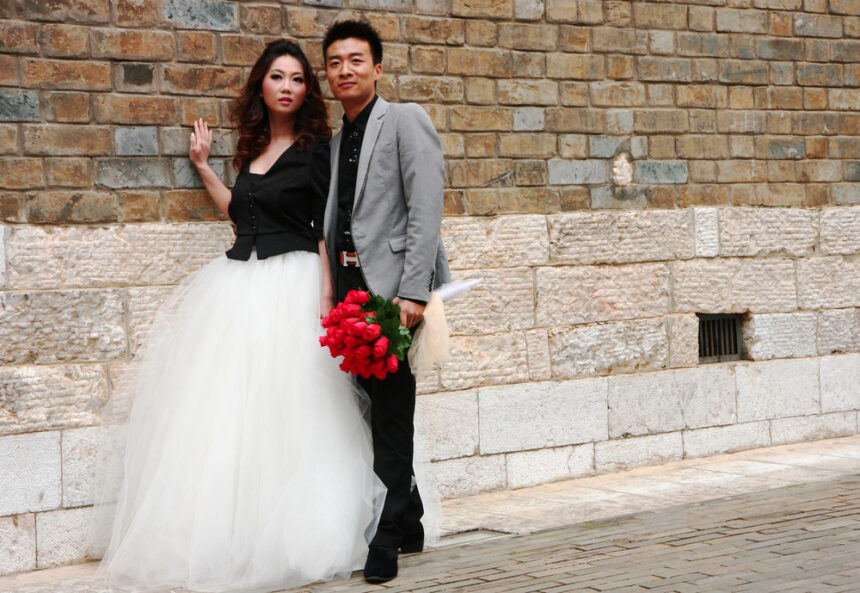Simple Chinese weddings are becoming a growing trend among young couples, moving away from the traditional, elaborate ceremonies that have long been a staple in China. When 26-year-old Xiao Peng met her fiancé on a bus in Chongqing’s Fuling district, they instinctively knew that this unconventional vehicle would be perfect for their wedding. “Compared to traditional wedding car convoys, buses are more eco-friendly and cost-effective,” Xiao said. Her wedding party spent the journey singing, taking photos, and reminiscing.
While buses as wedding vehicles are unusual in China, they symbolize a growing shift among young Chinese couples: moving away from traditional, elaborate weddings. Traditional Chinese weddings are known for their long vehicle convoys, numerous customs, and extensive guest lists.
The Cost of Tradition
According to a 2021 survey by Guyu Data, a platform under Tencent News, the average cost of a wedding in China was around 174,000 yuan ($24,350), nearly 8.8 times the average monthly income of a couple. Forty-two percent of surveyed couples admitted that their weddings exceeded their budgets.
Now, more young Chinese couples, like Xiao, are choosing simple Chinese weddings. They believe that by focusing less on customs and procedures, they can concentrate more on the experience, emotions, and true essence of marriage.
Lin Mo, 34, from Fujian province, held a streamlined ceremony this year. “My husband and I hosted the wedding ourselves, and the main ceremony lasted only 10 minutes, during which we simply addressed the guests and exchanged rings,” she said.
Rethinking Wedding Traditions
Lin believes many Chinese prefer high-profile weddings due to the concept of mianzi. Mianzi refers to one’s dignity or prestige in Chinese culture. “Weddings are very personal and not for showing off,” she said. Lin and her partner focused on their own experiences. They retained what they believed was most important. They prioritized elements that provided sufficient emotional value.
Streamlined and Personalized Weddings
Mei Zhigang, a sociology professor, explained. Chinese weddings have complex rituals. Modern life makes them impractical. Young couples prefer simple, personal weddings. These reduce costs and improve the experience.
In response to these changing preferences, local authorities across China are reforming wedding customs and introducing new measures. One such initiative is the promotion of collective weddings.
On August 10th, during this year’s Qixi Festival—also known as Chinese Valentine’s Day—a collective wedding ceremony was held in Chongqing’s Nan’an district. Organized by the local civil affairs bureau, dozens of couples donned traditional Chinese attire and embraced the moment together.
Embracing the New Norm
“It saved us a lot of money and effort since we didn’t have to find a venue, plan the procedures, or worry about unexpected incidents. The bureau handled everything,” said newlywed Xiong Qi from Chongqing’s Yubei district.
Chen Wei, an associate professor at the College of State Governance at Southwest University, supports these initiatives. He stated that collective weddings help avoid waste, reduce competition, and curb distasteful practices like vulgar wedding hazing. “They remind people of the true essence of marriage, which is love and responsibility,” Chen said.

